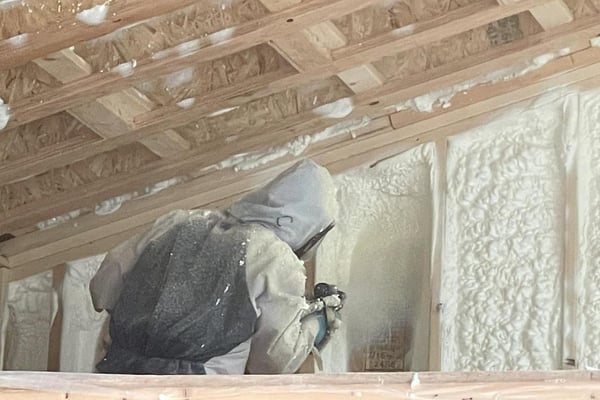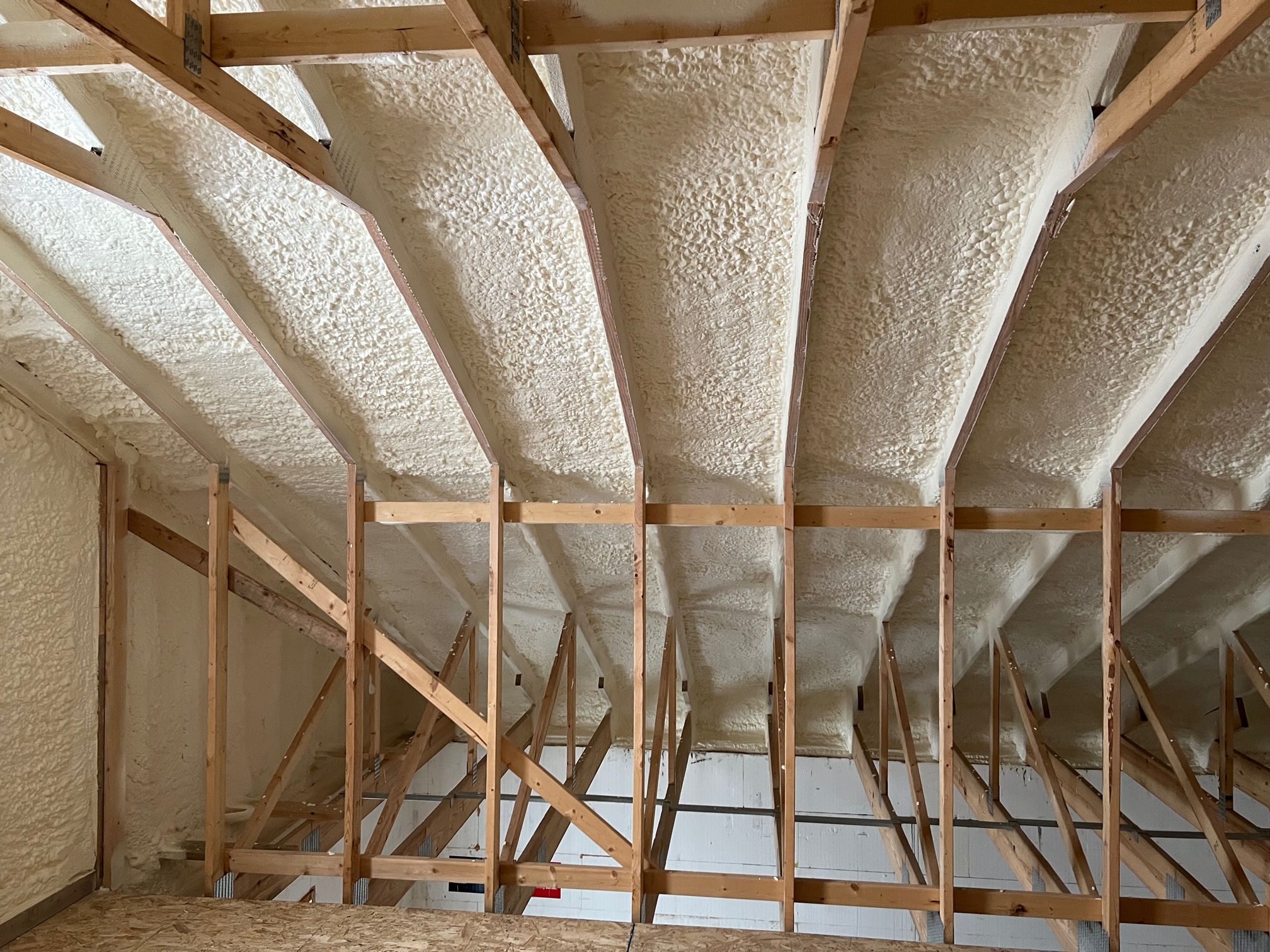Tips for Preserving Your Spray Foam Insulation for Long-Term Performance
Tips for Preserving Your Spray Foam Insulation for Long-Term Performance
Blog Article
Spray Foam: The Ultimate Solution for Air Sealing and Insulation
Spray foam insulation has become a leading service for effective air securing and thermal insulation, providing a special mix of buildings that set it besides typical approaches. Its capacity to increase and fill spaces makes it particularly effective in avoiding air leakage, which can considerably impact power effectiveness. However, recognizing the full extent of its advantages, installment processes, and comparisons with other insulation types is essential for making notified decisions. As we check out these facets, the effects for both brand-new constructions and retrofits become increasingly significant. What aspects should influence your selection?
What Is Spray Foam?
Spray foam is a functional insulation product that integrates the principles of air securing and thermal resistance to enhance power effectiveness in buildings. Made up largely of polyurethane or other comparable compounds, spray foam is applied as a fluid that increases upon contact with surfaces, creating a strong, constant layer of insulation. This unique home enables it to fill spaces, fractures, and voids that traditional insulation products might ignore, giving a remarkable air seal.
There are two major kinds of spray foam: open-cell and closed-cell. Open-cell spray foam is lighter and much more versatile, offering outstanding audio absorption and a lower R-value per inch - Spray Foam. In comparison, closed-cell spray foam is denser, offering a higher R-value, dampness resistance, and included structural honesty to developing components
The application procedure typically includes specific devices, guaranteeing a seamless application that abides by numerous substrates, consisting of concrete, steel, and timber. This adaptability makes spray foam appropriate for both new buildings and retrofitting existing frameworks. Its ability to develop an impermeable obstacle significantly contributes to minimizing power consumption and enhancing indoor air high quality, consequently making it a recommended option amongst builders and homeowners alike.
Benefits of Spray Foam Insulation
One of the most substantial advantages of spray foam insulation is its exceptional ability to create a constant air obstacle, which effectively lessens power loss. Unlike conventional insulation products, spray foam expands to fill up fractures and spaces, making sure that air leak is drastically lowered. This particular not only enhances power performance yet additionally results in reduce energy expenses with time.
Additionally, spray foam insulation provides exceptional thermal resistance, adding to a much more steady indoor setting. Its high R-value per inch permits efficient insulation in restricted rooms, making it optimal for attic rooms, wall surfaces, and crawl rooms. Furthermore, the moisture-resistant residential properties of spray foam aid prevent mold and mildew and mildew development, advertising healthier living conditions.
Another essential advantage of spray foam insulation is its sound-dampening high qualities (Spray Foam). It successfully decreases sound transmission in between spaces, producing a quieter and a lot more comfy home environment. The toughness of spray foam likewise attracts attention, as it does not sag or clear up over time, maintaining its performance throughout its life expectancy
Exactly How Spray Foam Works
Understanding just how spray foam insulation works is necessary for valuing its effectiveness in air sealing and thermal resistance. Spray foam insulation includes 2 primary elements: isocyanate and polyol resin. When these parts are blended, they undertake a chain reaction that creates the product to broaden quickly, creating a dense foam that loads spaces, splits, and tooth cavities.
As the foam expands, it follows surface areas, developing an airtight seal that dramatically decreases air infiltration. This characteristic makes spray foam insulation highly reliable at protecting against drafts and moisture infiltration, which can cause power loss and damage with time. Additionally, the closed-cell variation of spray foam offers exceptional thermal resistance due to its inflexible framework, properly minimizing warm transfer.
The one-of-a-kind buildings of spray foam permit it to comply with irregular surfaces, guaranteeing extensive insurance coverage and a seamless barrier. Therefore, spray foam insulation not only improves power performance but also adds to enhanced indoor air top quality by reducing the accumulation of allergens and pollutants. Eventually, comprehending the mechanics behind spray foam highlights its duty as a superior choice for insulation and air sealing in both property and business applications.
Installment Process Review

Prior to installment, the room has to be sufficiently cleaned up and prepped, guaranteeing that surface areas are free from debris, dampness, and dust. Since impurities can jeopardize attachment and general performance, this action is crucial. Once the location is prepared, the application involves blending the 2 elements of the spray foam, which increases upon get in touch with and fills up voids effectively.
Trained specialists ought to carry out the setup, utilizing specific devices to ensure consistent coverage and optimal density. Security precautions, consisting of wearing protective equipment and ensuring appropriate ventilation, are imperative during this procedure. After application, the foam usually cures swiftly, developing a solid obstacle that boosts energy performance.
Comparing Spray Foam to Standard Insulation
When assessing insulation options, spray foam insulation stands out in contrast to typical materials such as fiberglass and cellulose. Unlike fiberglass and cellulose, which can permit air infiltration, spray foam expands upon application, filling up gaps and crevices to develop a closed seal.
In addition, spray foam provides a higher R-value per inch than typical insulation kinds, offering even more reliable thermal resistance in a thinner profile. This particular is particularly helpful in spaces with minimal cavity click over here now deepness. Furthermore, spray Web Site foam is resistant to moisture and mold development, which can be a considerable worry about cellulose and fiberglass, especially in humid atmospheres.
Nevertheless, spray foam insulation typically brings a greater upfront expense than its conventional counterparts. Homeowners have to evaluate this preliminary investment against long-lasting power financial savings and performance benefits. Ultimately, while both insulation kinds serve their purpose, spray foam arises as an advanced solution for modern-day insulation needs, especially in regards to air securing and thermal efficiency.

Conclusion
In summary, spray foam insulation represents a very efficient remedy for attaining ideal air sealing and thermal resistance. Its special residential or commercial properties, consisting of dampness resistance and noise dampening, make it appropriate for different applications in both new constructions and retrofitting jobs (Spray Foam). The preliminary costs might be greater compared to traditional insulation products, the long-lasting advantages, such as substantial energy financial savings and boosted interior air high quality, validate the investment and emphasize its value in modern-day structure techniques.
Spray foam insulation has emerged as a leading option for effective air securing and thermal insulation, using a special mix of residential or commercial properties that establish it apart from standard approaches.Spray foam is a flexible insulation material that integrates the concepts of air securing and thermal resistance to improve power performance in structures.When assessing insulation alternatives, spray foam insulation stands out in contrast to typical products such as fiberglass and cellulose. Inevitably, while both insulation types offer their purpose, spray foam click over here arises as a much more innovative remedy for modern insulation demands, especially in terms of air securing and thermal performance.
In summary, spray foam insulation represents a highly efficient service for accomplishing ideal air sealing and thermal resistance.
Report this page